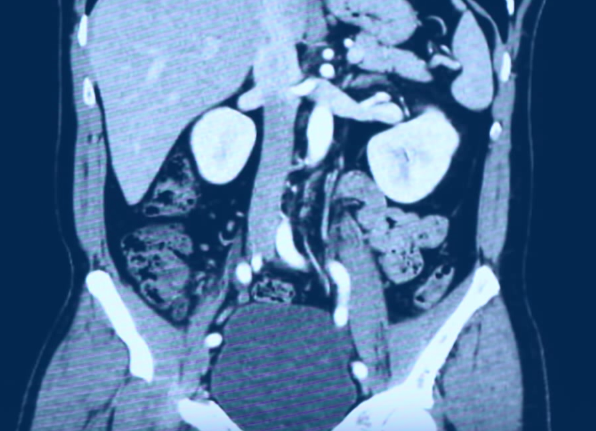A condition of swelling or enlargement of the bowel is referred to as a distended bowel. It can occur due to a variety of different reason, including intestinal blockages and bowel muscle or nerve problems, etc.
Treatment of distended bowel is dependent on underlying cause. Common practices include medications, diet changes, rest, and surgery in severe cases.
Symptoms of distended bowel
A few common signs and symptoms of distended bowel are listed below:
- Abdominal pain is one of the hallmark symptoms of distended bowel. Enlargement of the colon due to pseudo-blockage or bowel obstruction can stretch the colon tissue leading to cramps and pain. Such pain can occur in bouts or can be continuous.
- Distention of the bowel can cause the abdomen to protrude and become visible externally as an abnormally large stomach area.
- The abdomen may be very tender to touch. Even mild application of pressure on the abdomen can cause pain.
- Another common symptom is frequent nausea. Patients may also experience vomiting, which is an effect of nausea.
- Non-treatment of distended colon may lead to recurrent bacterial infections, which may trigger repeated cases of fever, body aches, etc.
- Malnutrition and loss of body weight may also be visible
- Most cases of bowel distention are accompanied by bowel movement changes.
- Patients may suffer from constipation for prolonged periods; it can occur due to bowel distention triggered by nerve or muscle issues or intestinal obstructions. In some cases, affected people may experience sporadic bouts of diarrhea.
- Distended bowel may sometimes result in fissures anus along with perianal soiling, especially in the elderly.
- Other areas and organs of the body may also suffer from problems due to distended colon; the stomach, esophagus and bladder are most commonly affected organs.
Causes
Distended bowel can occur due to many different causes, a few of which are mentioned below:
- A specific type of non-mechanical bowel blockage known as paralytic ileus can trigger distention of the colon. The condition is marked by ceasing of the rhythmic intestinal contractions called peristalsis. Subsequently the intestines become dilated and are not able to pass its contents to the anus for elimination from the body. Paralytic ileus may be triggered by underlying diseases like acute heart attack, chest infection, acute kidney failure, stroke, trauma, electrolyte imbalance, extreme hypothyroidism, or due to deterioration of diabetes. In some cases, it may develop in the postnatal period or after undergoing certain kinds of surgery.
- Hirschsprung’s disease is a congenital conditional known to be associated with distention of the bowel. Parasympathetic ganglion nerve cells are absent in patients and this affects peristaltic movement in the large bowel. Waste will subsequently accumulates in the large intestine becomes hard and can perforate the wall. It affects more males as compared to females.
- Intestinal hernia, wherein a section of the bowel protrudes from a weakened part of the abdominal wall, can trigger distended bowel.
- People with Kawasaki disease or Parkinson’s disease may suffer from hampered intestinal motility which can cause colon blockages, leading to varied symptoms of distended colon.
- Volvulus or twisting of the bowel is another cause of mechanical bowel obstruction. Volvulus can affect the large intestine, especially the sigmoid colon.
- Bed-ridden people or those using anti-psychotic meds are also at increased risk.
- Scar tissue or adhesions that develop after any kind of surgery of the abdomen along with entrapment of a part of the bowel is other common cause.
- Distended colon may also develop due to underlying digestive system diseases like diverticular disorder, Crohn’s disease, etc; solid dry stools due to serious constipation; inflammatory bowel diseases like pseudo-membranous colitis and ulcerative colitis; congenital bowel malformation; gallstones; and/or swallowing a non-digestive item.
Treatment of distended bowel
Distended bowel is treated as per the underlying cause. Hence, before beginning the treatment plan, doctors will ask the patient to undergo a variety of diagnostic tests. Based on the symptoms doctors will recommend tests such as X-ray barium enema of the large bowel, and ultra sonogram, etc. In some cases, patients may also be advised to undergo a CT scan of the abdomen. Once the cause is determined with the help of different tests, doctors may recommend relative treatment options.
A few options of treatment of distended bowel are listed below:
- The physician may prescribe different medicines such as antispasmodics, opioid painkillers, corticosteroids, or antiemetics for alleviation of the associated systems, especially in patients who suffer from intestinal obstructions after undergoing a surgery.
- In instances of pseudo blockages, the affected person may be asked to keep the stomach empty for a few days till the distention subsides. The patient may be fed with the help of a nasal tube during this period. Electrolytes and other essential nutrients will also be intravenously administered to him/her.
- In case of Hirchsprung’s disease, doctors may surgically remove the full colon segment where ganglion nerve cells are absent.

